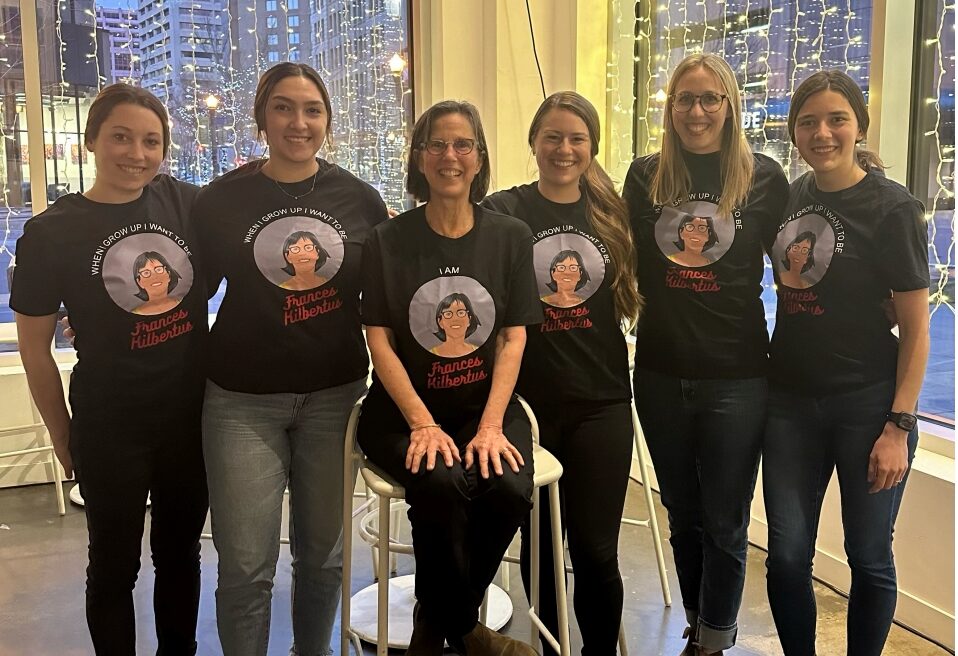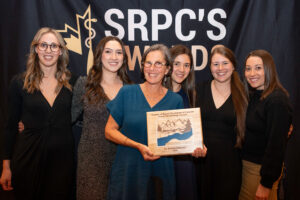Rural Generalist Pathway celebrates five years
Posted on September 2, 2025
It all began with a simple question, how can NOSM University get more physicians to work in rural areas? “Summit North,” held in January of 2018, brought together physicians from across the north to brainstorm ideas for increasing the number of physicians serving Northern Ontario. From this, the Rural Generalist Pathway (RGP) was born. Modeled after a successful program in Australia, the RGP provides medical students with mentorship and collegial support as they come to understand the realities of practising as a Rural Generalist.
In 2021, the program welcomed its first cohort of five students. All have since graduated and are now completing their rural family medicine residencies with NOSM University across Northern Ontario.
Dr. Sarah Newbery, Associate Dean of Physician Workforce Strategy and Professor at NOSM University, and a rural generalist family physician in Marathon, played a key role in developing the program. She says the goal of the program is to support medical students who aspire to become rural generalist practitioners, helping them fully understand the role and see themselves as rural generalist physicians, putting professional identity formation into practice.
Dr. Frances Kilbertus, Associate Professor and a rural generalist family physician in Mindemoya, has been the academic leader contributing to the program’s development and has served as a co-tutor for the first cohort of new graduates.
“As one of the preceptors in a rural practice where a RGP graduate has now started residency, I can honestly say that this is the pinnacle of my 40-year career in medical education,” Dr. Kilbertus says. “A resident who knows she wants to be a rural generalist practitioner, training in a community where she has built important relationships during her undergraduate education, and who is well prepared for the multiple challenges we face—that, in my experience, is a true gift for a teacher.”
Preparing for a career as Rural Generalist
Tara Hutchison and Chantal Powers are two of the recent graduates from the Rural Generalist Pathway. Both grew up in Northern Ontario communities and always wanted to study medicine. They both expressed that having a program that focuses on rural generalists made them feel supported in their decision to focus on rural family medicine.
“I think that I would still have chosen rural family medicine, but this program strengthened my confidence and drive to pursue it,” says Chantal.
The pathway program consists of regular facilitator-led small group sessions where the students open a dialogue around various topics related to rural generalist practice. These sessions might include narrative writing on concepts like clinical courage and rural ethics, exploring medical school challenges, planning for future placements, and more.
Dr. Kilbertus describes it as a safe “laboratory” space, as sometimes there is a negative stigma towards rural generalist practice.
“We have students who want to become rural generalists. We create a space where we talk about the challenges, the great stuff, the scary stuff, the really scary stuff, the strengths and weaknesses of the career,” says Dr. Kilbertus.
During their elective placements in Moose Factory, Chantal and Tara experienced the realities of rural medical practice firsthand, including working in an emergency department, receiving calls for help from other coastal communities, and seeing patients in-clinic.
“That experience sticks in my head as how awesome rural doctors can be,” says Chantal.
 From the students’ perspective, having a small group cohort was also helpful for navigating medical school. They were able to build friendships and strong relationships to keep each other going.
From the students’ perspective, having a small group cohort was also helpful for navigating medical school. They were able to build friendships and strong relationships to keep each other going.
“It’s helpful knowing that there are other like-minded individuals on the same path, facing the same struggles. They can relate in a way that colleagues in other fields just can’t,” says Tara.
Creating a sense of community was integral to the development of the program. The RGP connects students to a larger group of national and international professionals, so they don’t feel isolated in their practice. The students were also able to attend conferences and give presentations as a group.
“I think we’re realizing more and more in medicine that communities of people and communities of like-minded clinicians with similar aspirations are very helpful in supporting people to achieve what they want to achieve,” says Dr. Newbery.
Looking forward
Both Chantal and Tara began their first year of residency in July 2025. Chantal is in Espanola, while Tara is based in Mindemoya. The program allowed them to develop relationships and community ties in areas that they wanted to practise.
“Returning to a familiar placement site where I had trained in my third year of medical school was a huge relief and eased my anxiety,” says Tara. “Starting residency knowing I was going to a community where I was supported and already familiar with the system allowed me to hit the ground running. Seeing familiar faces from two years ago in my clerkship has already been helpful.”
Dr. Kilbertus hopes to expand the program to accept students at all levels of their undergrad medical education whether in second- or third-year, or pre-residency training.
“In the future, we will create more entry points, attract students who are genuinely drawn to rural generalism and NOSM University, and ensure that they have opportunities early on to establish or strengthen relationships with rural communities in Northern Ontario,” she says.
As they begin this next phase of their medical career, the graduates encourage other students to keep an open mind towards rural generalist family medicine.
“Jump in with both feet,” says Chantal. “In a rural hospital, you’ll often have better learning opportunities as you’re frequently the only student there and people are willing to help you.”
Tara adds, “Try to experience rural medicine firsthand and form your own opinion. Try multiple places, don’t just visit one community and rule out rural medicine forever. I highly recommend it.”

